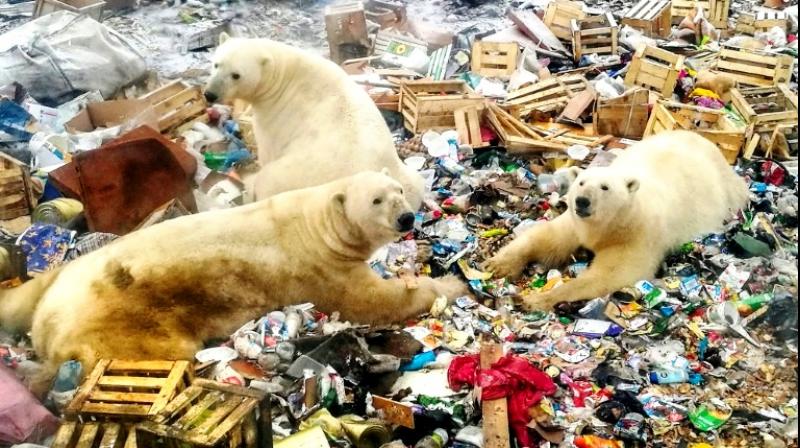Human and polar bears conflict due to climate change
Russia's Arctic plans add to polar bears' climate woes by preventing them from hunting seals.

Russia: Last month's visit by roaming polar bears that put a Russian village on lockdown may be just the beginning. For as Moscow steps up its activity in the warming Arctic, conflict with the rare species is likely to increase.
More than 50 bears approached Belyushya Guba, a village on the far northern Novaya Zemlya archipelago, in February. As many as 10 of them explored the streets and entered buildings.
Local authorities declared a state of emergency for a week and appealed for help from Moscow. Photos of the incident went viral, with some observers blaming officials for ignoring a sprawling garbage dump nearby where the animals feasted on food waste.
But polar bear experts say the main reason the Arctic predators came so close to humans was the late freezing of the sea. It was this that kept them from hunting seals and sent them looking for alternate food sources.
And as Russia increases its footprint in the Arctic, pursuing energy projects, Northern Passage navigation and strategic military interests, experts expect more clashes between humans and bears.
"Development in the Arctic will definitely increase conflict with humans, especially now that the polar bear is losing its life platform in several regions and coming ashore," said biologist Anatoly Kochnev, who has studied polar bears in the eastern Arctic since the 1980s.
Novaya Zemlya, an archipelago of two islands between the Kara and Barents seas, is a good example of Moscow's new frontier that falls inside the polar bear habitat. Bears in the Barents Sea are seeing the fastest ice reduction of the species' range, having lost 20 weeks of ice a year over the last few decades, according to Polar Bears International.
"Ice monitoring shows that previously, ice near Belushya Guba formed in December," said Ilya Mordvintsev from the Severtsov Institute in Moscow, who was in a group of scientists flown out to aid the village.
"For thousands of years, they migrated this time of year to hunt seals. This year they came to the shore and there was no ice." Since the incident, ice has formed and the bears have left land to hunt, he said. "But it's impossible to rule out a repeat of the situation in the coming years."
And as more humans come to Novaya Zemlya, the likelihood of human-bear conflict increases. A Soviet-era nuclear weapons testing site, Novaya Zemlya remains a restricted territory. But following a post-Soviet hiatus, the military has put up new buildings and an aerodrome.
Moscow announced in 2014 that the Arctic was a strategic priority for its military. Kochnev in 2015 wrote an emotional blog post after a bear near a military construction site on Wrangel Island swallowed an explosive flare. He criticised the new base, and was fired from his job in a national park as a result.

